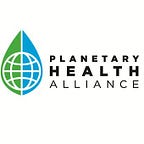Sooner or Later, We Will Understand
Aminat Adebayo, PHCA 2021
The interconnection of nature with everything on earth is inextricable — from food, water, raw materials, medicinal resources, weather patterns , Earth’s beauty, and even how nature is an integral part of our recreation and tourism. Everything is connected..
As nature covers every aspect of our lives, we could call it the root of our existence. Is it not mind-boggling that humans extensively treat nature as a resource to be exploited?
Since the industrialization era, human activities have been tampering with nature. From how we generate power through dam rivers, how we control water for irrigation, how we allow deforestation for other purposes, how we encourage mineral exploration to assemble the conveniences of modern existence, amongst many other practices humans engage in disrupt the natural system. Now, it has reached a point where our planet’s natural systems are beginning to disentangle. Is it not unfathomable that modernization which is supposed to give us a better life rips off what makes our existence matter?
The degradation of earth systems is alarming. It has caused loss of biodiversity, rising carbon dioxide in the atmosphere, and loss of forests. These are major contributors to climate change which is associated with intense extreme weather events including flooding, tropical storms, forest fires, heatwaves, decline in conditions for food productivity etc. How paradoxical would it be if humans say they do not know the roots of the natural disasters that stemmed from their actions?
Our actions on earth affect our health; the consequences of our activities on earth affect us in ways beyond our control. Infectious diseases exposure, non-communicable disease outbreak and mental health deterioration are some of the major health concerns the world is facing. According to a Planetary Health book, Protecting Nature To Protect Ourselves, “key environmental drivers such as climate change, biodiversity loss, pollution, land-use changes and alteration of biogeochemical cycles cause changes in the abundance, distribution, physiology and behaviour of species involved in the transmission of both zoonotic and non-zoonotic pathogens to humans.”
Climate change affects the distribution and prevalence of vector-borne diseases, for example, malaria. Climate change tends to affect the quality and quantity of the food produced by affecting agricultural productivity and in turn, contributes to the increased rate of malnutrition, reduction of immunity to several infectious diseases resulting in morbidity and mortality. Is it still not obvious that our reactions to nature caused nature to bite us back?
Research published by MINNESOTA POLLUTION CONTROL AGENCY indicated that air pollution can affect the air we breathe, cause irritation, coughs and exacerbate the diseases involving lungs and breathing. Our day-to-day activities contribute to overall air pollution. I believe if we look deep into nature, we will understand why the quality of air reduces daily. We will understand why there is a decline in agricultural productivity, hence, food shortage. We will understand why our lack of a natural view has caused our mental health to deteriorate. We will understand why zoonotic diseases have become rampant in today’s world. We will understand why the news seems incomplete without a natural disaster.
Through our actions, we can improve the natural system. Our habit of clearing forests for other purposes has to be well regulated in order to conserve nature. The most substantial driver of land-use change is agriculture. Hence, we can minimize food wastes to promote sustainability, we can manage our resources judiciously to promote sustainability, and in turn care for future generations. If we look deep into nature, we will understand everything better and understanding will give us the solutions. With the solutions, we can RIGHT OUR WRONGS.
